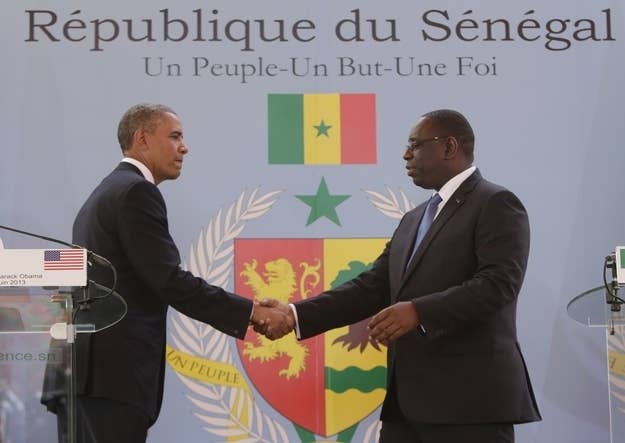
WASHINGTON — A day after the Supreme Court took up his call to expand gay rights in America, President Obama used a joint press conference with the president Senegal to push both his country and the nations of Africa to do more to free the LGBT community from legal discrimination.
In response, Macky Sall, the Senegalese President reaffirmed his country's criminal code outlawing homosexuality — and also noted his nation has outlawed capital punishment.
It was a rare and fascinating discussion about LGBT rights on the international stage.
Obama again celebrated the Supreme Court's decision on DOMA and said it was time to one step further and eliminate the remaining DOMA language allowing states without legal same-sex marriage laws to refuse to accept the legal marriages of same-sex couples from other states.
"It's my personal belief -- but I'm speaking now as a President as opposed to as a lawyer -- that if you've been married in Massachusetts and you move someplace else, you're still married, and that under federal law you should be able to obtain the benefits of any lawfully married couple," Obama said. "But I'm speaking as a President, not a lawyer."
He then turned his attention to his host nation. Senegal is the first stop on Obama's trip across Africa, and like several countries there, it outlaws homosexuality. A reporter asked Obama to comment on Senegal's law.
"I want the African people just to hear what I believe, and that is that every country, every group of people, every religion have different customs, different traditions. And when it comes to people's personal views and their religious faith, etc, I think we have to respect the diversity of views that are there," Obama said. "But when it comes to how the state treats people, how the law treats people, I believe that everybody has to be treated equally. I don't believe in discrimination of any sort."
"I speak as somebody who obviously comes from a country in which there were times when people were not treated equally under the law, and we had to fight long and hard through a civil rights struggle to make sure that happens," Obama added.
In response, Sall defended his nations laws and insisted they don't mean the Senegalese or other people who criminalize homosexuality are anti-gay.
"These issues are all societal issues basically, and we cannot have a standard model which is applicable to all nations, all countries -- you said it, we all have different cultures. We have different religions. We have different traditions," Sall said. "And even in countries where this has been decriminalized and homosexual marriage is allowed, people don't share the same views."
Sall said his country, which is mainly Muslim, isn't at the point where it can change its laws to be more tolerant of homosexuals. But he insisted that didn't mean Senegal is bigoted against the LGBT community.
"Senegal, as far as it is concerned, is a very tolerant country which does not discriminate in terms of inalienable rights of the human being," Sall said. " But we are still not ready to decriminalize homosexuality. I've already said it in the past...while we have respect for the rights of homosexuals -- but for the time being, we are still not ready to change the law."
To prove his point about the time it takes for a nation to evolve, Sall spoke of capital punishment, something his country doesn't have but Obama's does.
"The society has to absolve these issues. It has to take time to digest them, bringing pressure to bear upon them, on such issues. It is just like the capital punishment," he said. "In our country, we have abolished it for many years. In other countries, it is still the order of the day, because the situation in the country requires it. And we do respect the choice of each country."
